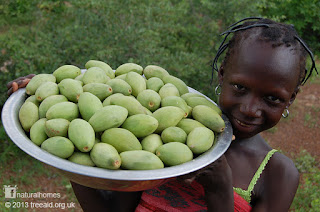Shea Butter Business as an initiative to reduce poverty among northern women
"Shea butter for centuries has been called "women's gold" not only for its rich golden colour, but also because it primarily provides employment and income to millions of women across the continent" (Rebecca Moudio, how shea butter nourishes opportunities for African women, 2013).
In as much as we are encouraging the use of locally manufactured products on the market, there is a different aspect to using these products-poverty reduction especially among the women in Northern Ghana.
The deprivation of basic social amenities, lack of basic infrastructure and services seem to be compounded by the immense rate of poverty, early child marriage and marital abuse in Northern Ghana.
Women in the Shea butter industry are not only worried about the vigorous means of making the shea butter, but also the low incomes they make from the business. A BBC report published in May 2016 indicated that, after five days of picking, crushing, roasting, grinding and cooking, a 65year old Rebecca Atornyege could earn only 8Gh cedis from selling her shea butter on the market.
UNDP estimates that, an average of 3million African women work directly with the shea butter business, with Ghana among the top shea nut producing countries in Africa.
According to the New York Times, a survey conducted in Burkina Faso by USAID indicated that, there was an additional $1,580 increase in economic activities for every $1000 of shea nuts sold. This can be achieved in Ghana too.
Several initiatives have come up to reduce the poverty levels among the women in the shea butter industries. As part of empowering these women, an initiative was taken by The Global Shea Alliance, an association that promotes quality and sustainability in shea butter industry's support for rural African communities and women's empowerment, organized the New York Shea Butter Trade Industry conference with the aim to provide a platform for exchanging ideas across the supply chain of collectors, producers, traders, industrial users and consumers of Shea butter.
Be part of this amazing initiative, invest in shea butter, use shea butter products made locally and help employ more women, help reduce poverty and increase Ghana's income for a sustainable development.
Be part in helping people who want to realize their dreams, especially a 65 year old Rebecca Atornyege who wants her daughter to become a doctor in future.
Help save the future of Northern women because for these women, even the modest increase in their incomes can make a big difference.
In as much as we are encouraging the use of locally manufactured products on the market, there is a different aspect to using these products-poverty reduction especially among the women in Northern Ghana.
The deprivation of basic social amenities, lack of basic infrastructure and services seem to be compounded by the immense rate of poverty, early child marriage and marital abuse in Northern Ghana.
Women in the Shea butter industry are not only worried about the vigorous means of making the shea butter, but also the low incomes they make from the business. A BBC report published in May 2016 indicated that, after five days of picking, crushing, roasting, grinding and cooking, a 65year old Rebecca Atornyege could earn only 8Gh cedis from selling her shea butter on the market.
UNDP estimates that, an average of 3million African women work directly with the shea butter business, with Ghana among the top shea nut producing countries in Africa.
According to the New York Times, a survey conducted in Burkina Faso by USAID indicated that, there was an additional $1,580 increase in economic activities for every $1000 of shea nuts sold. This can be achieved in Ghana too.
Several initiatives have come up to reduce the poverty levels among the women in the shea butter industries. As part of empowering these women, an initiative was taken by The Global Shea Alliance, an association that promotes quality and sustainability in shea butter industry's support for rural African communities and women's empowerment, organized the New York Shea Butter Trade Industry conference with the aim to provide a platform for exchanging ideas across the supply chain of collectors, producers, traders, industrial users and consumers of Shea butter.
Be part of this amazing initiative, invest in shea butter, use shea butter products made locally and help employ more women, help reduce poverty and increase Ghana's income for a sustainable development.
Be part in helping people who want to realize their dreams, especially a 65 year old Rebecca Atornyege who wants her daughter to become a doctor in future.
Help save the future of Northern women because for these women, even the modest increase in their incomes can make a big difference.











Comments
Post a Comment